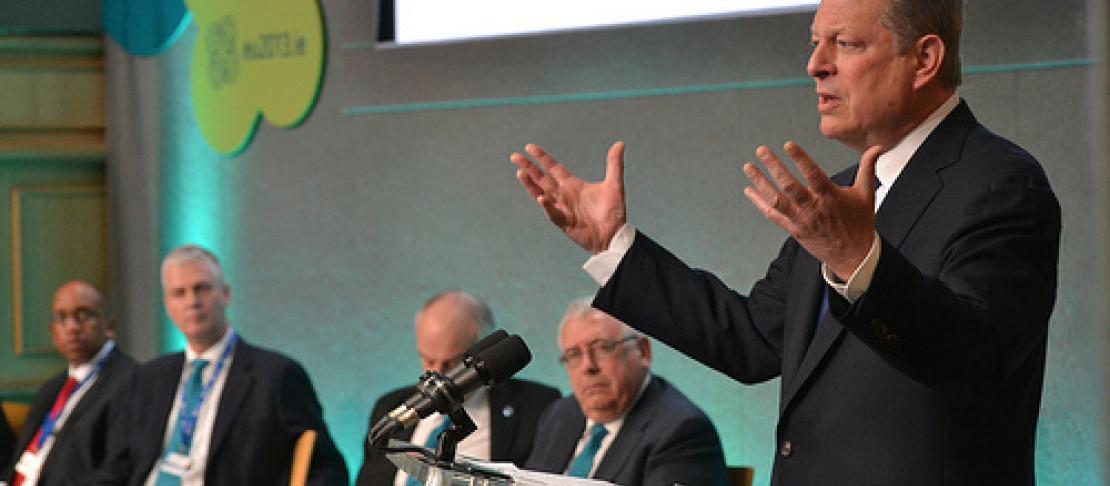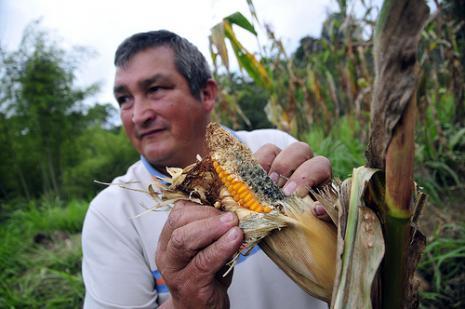Al Gore pinpoints climate risks for farmers

by Cecilia Schubert
We need to face climate denial head on and speak up about climate injustices around the world. These were the rousing words from Al Gore, who encouraged audience members at the Dublin Conference to take action on climate change now.
There is an urgency to try and prevent the worst damage that can occur from climate change, Al Gore said to a full packed room, many of whom had come from distant nations, such as the Pacific island of Vanuatu, Malawi and Nunavut in the Arctic.
Vanuatu, together with the neighboring islands Kiribati and Tuvalu, are all at great risk of inundation due to sea level rise, which means we need to act now, to secure a habitable future for everyone.
We have to connect the dots, Gore emphasized. We know where the pollution is coming from and we know what it does and we know what it WILL do if we continue at this pace. But more importantly, we know what actions we have to take. We need to change our behavior - and not the climate. Decreasing greenhouse gas emissions is one important step, but we also need rural communities to adapt.
This was also one of the core ideas of the conference, which enabled participants to share their stories from ongoing projects and activities, to share what they have learned while trying to create social change related to hunger and malnutrition and climate justice in their communities.
All of the presenting participants face climate risks of some kind, which they need to manage on a daily basis.
Read their stories here: Case studies Dublin Conference
But even if activities are underway, there is still more work that needs to be done. Al Gore talked about the situation for smallholder farmers, and their need for support and assistance to adapt to the changes. Farmers continue to face droughts, pests, insects, and weeds, which are all increasing in magnitude and frequency as the temperature rises. These factors all block progress to end hunger and malnutrition.

Farmers’ ability to predict weather is reaching its limit today. More significantly, the timing of precipitation is colliding with the knowledge that has passed down from older generations. Knowledge that used to be valued, when to plant and harvest, has lost its relevance.
But there are solutions. We know how to prevent more damage being done, and we know how to assist those who need it the most, said Al Gore. There is great potential in irrigation, agroforestry, increasing fertility and regenerating the soil, many activities that we, the CGIAR Research Program on Climate Change, Agriculture and Food Security (CCAFS) and other CGIAR Research Programs are doing research on.
Traditional knowledge, coupled with scientific, new information, can make all the difference in helping farmers adapt, Gore concluded.
Participation of those who live with the complex issues of climate change everyday is key, in order to develop a better understanding for what they are coping with, and how they can be empowered. This is what we need to focus on, while ensuring that the changes in our climate are taken seriously and acted upon.
Learn more about how we work directly with farmers input, to help create climate resilience and facilitate adaptation:
Read: Testing appropriate climate smart practices with farmers' help.
Watch video: Researchers and farmers work together to package and communicate climate information.
Hear the voices of people experiencing climate change on a daily basis:
- Pastoralist voices on climate change
- Participatory videos in Nepal: Voicing women’s perceptions on climate change
Cecilia Schubert is a Communications Assistant at CCAFS. The CCAFS team is reporting live from the Hunger, Nutrition, Climate Justice conference in Dublin from 15-16 April 2013. Watch live webcasts at www.eu2013.ie and follow updates on the CCAFS blog. Engage with us on twitter @cgiarclimate using #HNCJ.